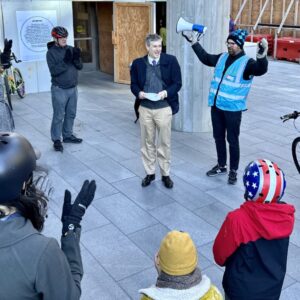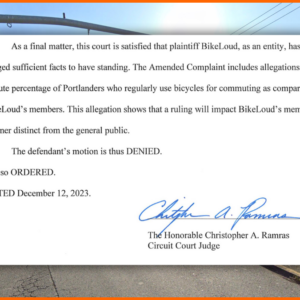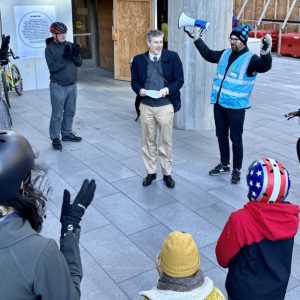It might not feel like it yet, but the lawsuit filed Friday by BikeLoud PDX could be a very big deal once the legal process plays out.
Why is that my hunch? For starters, the lawyers representing BikeLoud are no joke. I sat down with one of then, Scott Kocher of Forum Law Group, on Friday. Kocher rolled over to the BikePortland Shed (our new workspace I can’t wait to invite you to someday!) to talk to me about it just hours after he filed the paperwork at the Multnomah County Courthouse. And Kocher is joined on the case by the three lawyers from Thomas, Coon, Newton & Frost — one of the most respected law firms in Oregon.
In our conversation Friday, Kocher says he’s based their approach to the case on precedent set by the Oregon Court of Appeals in the landmark 1995 lawsuit that transformed the Bicycle Transportation Alliance (now The Street Trust) from a tiny grassroots group into a significant player in statewide transportation politics.
In this episode you’ll learn more about why BikeLoud has brought this case, what the Oregon Bicycle and Pedestrian Bill is, why Kocher feels like it has important parallels to the American with Disabilities Act (ADA) law, and how he he thinks it should apply to specific projects like the recently “Pave and Paint” project on Hawthorne Boulevard.
Listen above or wherever you get your podcasts. If you have a smart speaker, just tell it to “Play the BikePortland Podcast.”
Thank you so much to our 400+ subscribers who make content like this possible. Please consider joining them to support our work.







Thanks for reading.
BikePortland has served this community with independent community journalism since 2005. We rely on subscriptions from readers like you to survive. Your financial support is vital in keeping this valuable resource alive and well.
Please subscribe today to strengthen and expand our work.
Awesome interview, and so exciting to imagine what this will mean if Scott and team prevail.
Fascinating interview, thank you Scott and Jonathan.
Wow, wow, wow, this is tremendously exciting. The part of the interview which most caught my attention was the bit about the records requests. Apparently the Bike Bill requires agencies to document the reasoning in support of variances to, or noncompliance with, the law, but that documentation appears to be absent.
This is one of the things that drives me up the wall with the city on a number of ordinances, from noise to frontage improvements to speed setting. The ordinances look great on the books, but the city varies from them with no, or minimal, explanation of the need for an exception.
The most recent example of this to come to my attention is the city’s decision not to allow a sidewalk to be built on Southwest Gibbs, near OHSU. What’s the problem? Why no sidewalk? It’s your guess—there’s an ordinance requiring one. By not enforcing the sidewalk ordinance, Development Review has established a new norm in SW Portland.
What ends up happening is that requirements gradually melt away through variances and non-enforcement. Sort of a non-compliant “common-law” which undermines the actual written requirement.
Yes to all that. The other part of selective application of rules is that it turns citizens into “bad guys”.
It’s common knowledge that many City compliance processes are complaint driven–the City only requires correction of say, a zoning violation, if someone complains. It makes some sense when it’s something the City wouldn’t know about without a complaint. But it’s also done with things like zoning compliance in building permit reviews, when the City sees something like a setback violation, but ignores it unless someone complains. The result is the complainers can receive the ire or revenge of the violator, while the City can say, “Don’t blame us. We only are requiring this of you because someone (often obvious who that is) complained”.
In this lawsuit case, making a public records request is a neutral action. But when the City doesn’t comply, then the requesting party has to raise a fuss or even sue to get the City to do what it should have done automatically. And the same with the lawsuit as a whole. If the City now revisits a completed street project and, for instance, removes on-street parking to put in a bike lane, now the businesses can blame BikeLoud and its lawyers (and “bike people” in general) for causing that, when they should never have even been involved, because the City should have automatically followed the law in the first place.
I think Scott was being a bit disingenuous about the public records request. A public agency can’t deny a request, which is what he implied. But what they can do is charge a fee for the considerable staff time required. He basically admitted in the interview that the city refused to waive the fee, which is not the same as refusing to provide the records.
So proud of Scott and BikeLoud. This is a long time coming. Thank you so much.